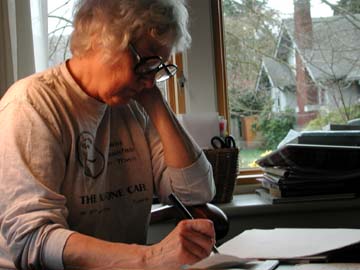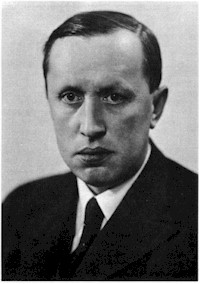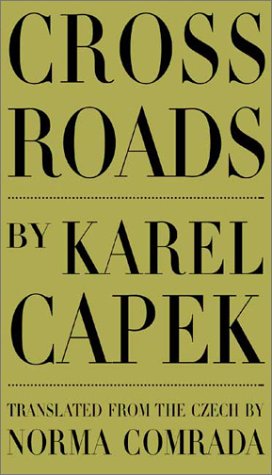NORMA COMRADA
 Norma Comrada is internationally recognized as one of the leading English language translators of Karel Capek. Click on the name for more information.KAREL CAPEK  Karel Capek is a Czech author, playwright, journalist and translator. He was the first Czech writer to become recognised worldwide, thanks in no small part to Norma Comrada. |
by David Jagernauth
The 21st Century is less than a month old. Norma Comrada finds herself wandering around Prague at night. The snow is untouched. The cobblestone streets, vacant. She crosses over the Charles Bridge toward a castle in the distance.Comrada had been invited to the International Karel Capek Symposium, a gathering of Capek translators, scholars and fans from all around the world. Each notable was encouraged to take the podium and give a speech about Capek.
When it is Comrada's turn she reads one of her translations, a poem written by Capek in 1936. It is aptly named "The End of the Twentieth Century." The poem was inspired by fascist bombings during the Spanish Civil War and Capek's horror at how schools and hospitals were targeted. Like most of Capek's writings, it seemed as relevant today as it was over half a century ago.
Norma Comrada reads "The End of the Twentieth Century"
To balance out the first poem, she reads her translation of Capek's poem "Adam and Eve." She feels it nicely illustrates Capek's lighter side.
Norma Comrada reads "Adam and Eve"
"He wrote it in the summer," Comrada says. "I cannot imagine what brought it on, except for the agony of having to choose where to vacation."
It is a fun piece but Comrada took the translation very seriously.
"It took me 20 years in the back of my mind for one little phrase change, one minute change. It took me forever to come up with 'young sir.' It was just sort of bumbling around in the back of my mind over a good many years, and the moment I got it I knew that was it."
In the original Czech it reads literally, "I know that you were listen to Eve." Comrada got the elements of the original but made quite a change to the structure of the quatrain.
"If you did it word for word it would be stupid, dumb, uninteresting and a crime. Outside of that, no problem."
Comrada remembers another time when she was trying to translate one of Capek's poems that was entirely in meter.
"Heaven knows the muscles of the ankles and toes I developed in beating out the meter to make...my...trans...la...tion...fit...the...me...ter...per...fect...ly. But I made it happen. And I think it is just terrific!"
While Capek didn't write much poetry--when compared to his volumes of stories, plays and political and social commentary--Comrada seems drawn to his verse. Before she got into translating, she wrote poems in English. It comes naturally to her.
In fact, when Norma Comrada speaks about one of her translations, she speaks in poetry:
"The story opens up:
you hear the clop
clop
clop
of carriage horses
outside
and a man standing at his desk.
Very quickly
things begin to disappear
and dissipate.
The sounds into the distance, time
is not a factor in this.
The man himself,
everything seems to merge
Into planes."
She pauses, smiles, remembers how she struggled with the concept. Planes.
"There are different ways to translate this business. Is this a place where I can say sheet? Are we going to think of bed sheets? I have to watch out for that too. Yeah, this one was difficult."
She is describing one of the early works of Karel Capek. At the time he was captivated by cubism. This story, collected in a book of his translated short stories called Cross Roads, was his attempt at literary cubism.
"Sometimes it flows very easily and sometimes it is very very hard," Comrada says. "I can't tell you how long that took to translate. I know I am good but I am slow. And I was slower than slow on this."
But even when the going is tough, she still loves translation.
"It is just great fun finding terms that are appropriate without seeming out of place because they're too trendy, they're too slangy, they're too 'nuevo' for us. And to get the rhythm."
She has to be nitpicky because her fans are. "I get letters from the Czech Republic asking, 'How come you choose that word instead of this word?' It makes me stop and think, and I really appreciate it."
Comrada says that there are three reasons why she is such a good translator. "First, I know my language. I might not know Czech that well, but I know my language. And I know how to research and ask questions. There is a very definite sympathy between his writing, his beliefs, his values and mine.
"I'd do it just for the fun of it. Don'tcha know?"
Looking back on her life translating Capek, Comrada feels she has made a lasting contribution. She points to an encounter while she was in Prague.
In the crowd she met a fellow Czech-to-English translator. The man said, "I would do Capek except there is some woman in America--Comrada, Somrada, something like that--she has scarfed up all the good ones."
Comrada smiled and said, "Would you like to meet her?"
And she stuck out her hand.


